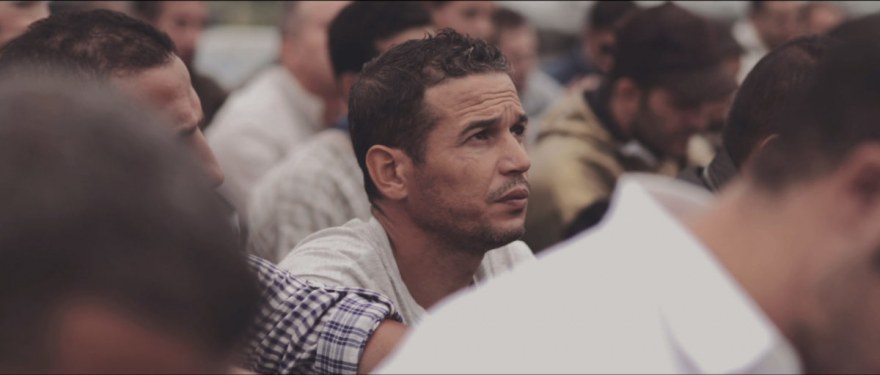Dinner with E.T.E.R.N.I.T
Interview with Giovanni Aloi, director of E.T.E.R.N.I.T..
In E.T.E.R.N.I.T. you address the matter of the new life offered by family reunification services to your main character after many years of separation from his family. Did you enquire about the true length of time people wait to welcome their families to their new country?
During the research phase, I had several interviews with workers at an asbestos disposal factory. In fact, the film is based on the life of the main character, Ali Sahli. During our conversations, he confided in me, telling me with tears in his eyes about the endless wait for a visa for his wife and child.
In E.T.E.R.N.I.T., you also address human relationships. Why were you interested in presenting a dilemma like the one shown in the film?
In my view, separation is an ordeal that all people experience at least once in their lives. During the writing of the script, I was myself in the middle of a break-up. The film doesn’t only cover the life of a Tunisian immigrant in a relationship with this 60-year-old Italian woman. E.T.E.R.N.I.T. also sheds light on the entire process of freeing oneself.
Are you interested in the immigration movements around the Mediterranean basin?
Of course, it is something we can’t forget. It is a part of our daily life on an international level. E.T.E.R.N.I.T. tells the story of immigrants who have lived in Italy for a long time. After 10 years of struggling, they have succeeded in integrating and finding their place in society. However, if we look more closely, we realize that they don’t have their own prayer space, that they have to gather every Friday in a parking lot. This space that was conceived for automobiles becomes their mosque for an hour and a half.
And are you interested in general by the themes of work and unemployment? Why did you choose the context of asbestos disposal?
Work determines one’s life and social relationships. But working also allows us to coordinate our schedules and demarcate our space. Our work says a lot about our lives. To choose an asbestos disposal factory as the context seemed obvious to me. It serves as a visual metaphor of the final days of a romantic relationship.
Your main character is very capable, but he creates disappointment. Why didn’t you choose to show the different missteps that led him to taking the wrong path?
He didn’t take the wrong path. He simply made his own choices.
.
What would have changed if you had placed your main character in a rural setting instead of a large city?
The choice reflects reality. I chose to shoot the film in the places where my character lives and works each day. I shot the film with real workers from the asbestos disposal factory as well as real tools from the work site.
How did you conceive the elements of height and size contrasts in E.T.E.R.N.I.T., such as the beautiful helicopter shot?
I wondered about the relationship between man and God, and on how God might perceive these tiny creatures. It’s a question of distance, but also of closeness.
In E.T.E.R.N.I.T., you also question the principle of attachment, as it seems that your main character has only one deep relationship and all his others are superficial. Why did you want to create this feeling of detachment?
In fact, there are men who show no emotion yet have a very intense interior life. This is exactly the dimension I wanted to give to my main character.
Do you think short film is effective in questioning the meaning of family and of “macro” social units?
The short film is a format that provides immense freedom to authors to explore the language of cinema. I think it is a wonderful approach to question many different themes.
E.T.E.R.N.I.T. was either produced, co-produced or self-financed with French funds. Did you write the film with this “French” aspect in mind: in building the film’s context or in questioning certain notions?
The film was produced by Bien ou Bien Productions, a French company located in Cenon near Bordeaux. E.T.E.R.N.I.T. was supported by the Aquitaine region and the Cineteca di Bologna, with many private partners such as The Sponk Studios, 37th Degree and Beca Coperture.
My cinematographic influences tend to be German. E.T.E.R.N.I.T. is a tribute to Angs essen Steele auf (Ali: Fear Eats the Soul) by Rainer Werner Fassbinder.
.
E.T.E.R.N.I.T. is being shown in National Competition F4.








